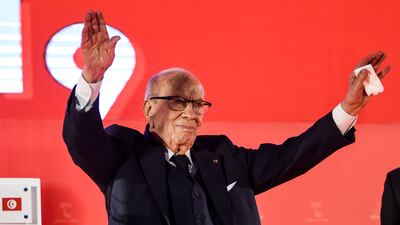Tunisia’s justice minister has officially requested an investigation into the death of former president Beji Caid Essebsi, the official spokesman for the country’s court of appeals said.
Justice Minister Leila Jaffel officially submitted her request to the Tunisian public prosecutor.
Caid Essebsi died in a military hospital in Tunis on July 25, 2019 at the age of 92.
Habib Tarkhani, spokesman for the Tunisian court of appeals, told the Tunis Afrique Presse (TAP) news agency that the attorney general at the appeals court has already authorised officials at the Court of First Instance in Tunis to open an investigation into the circumstances of the president’s death.
Caid Essebsi played a major role in the North African country’s transition to democracy after a revolution in 2011.
A month before his death, Caid Essebsi spent a week in hospital after suffering what authorities described as a “severe health crisis”.
In recent weeks, Caid Essebsi’s son Hafez has been claiming during television interviews that his father had fallen ill as a result of "food poisoning", which may have contributed to his death. The claim recently gained popularity among Tunisians, prompting the justice minister’s recent decision.
Tunisia’s Beji Caid Caid Essebsi - in pictures
Former minister and the secretary general of the Nidaa Tounes party, Naji Jalloul, had also questioned the circumstances surrounding Caid Essebsi's death, saying the president was in good health only days before he died.
Caid Essebsi won the first democratic election in 2014, three years after Zine El Abidine Ben Ali stood down in the face of mass protests at the outset of the 2011 Arab uprisings.
In 2019, Caid Essebsi had said he did not intend to stand for office after the end of his presidential term and the country needed a younger leader.
After Ben Ali left the country in the face of mass rallies in 2011, Caid Essebsi helped draft a new democratic constitution and played a key role in paving the way for the 2014 election that he won.
He followed his mentor Habib Bourguiba, the founding father of Tunisia who was removed by Ben Ali in 1987.
He worked to improve education and develop the impoverished interior while promoting women's rights. He was praised for ending a 44-year-old law that banned Tunisian women from marrying non-Muslim men.














